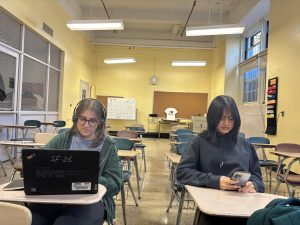Despite the nationwide implementation of a phone ban, the policy has been delayed in over 1,800 New York City public schools for the 2024-2025 school year. Mayor Eric Adams acknowledged that while some level of phone restriction will be enforced, officials still need time to develop the most effective plan. “If you don’t do it right, you won’t get it right,” he stated at a press conference before the start of the 2024-2025 school year.
Forest Hills High School is following the DOE guidelines. On September 1, 2024, Assistant Principal of Security and Administration, Mr. Bardossas sent an email regarding the FHHS Student Cell Phone Policy to parents and students. “If you bring a cell phone or other electronic device to school, they cannot be used in school and must be turned off and properly secured. Students MAY NOT use their cell phones in the halls or class unless instructed by the classroom teacher for educational purposes,” the email says.
This is the policy the school has decided to put into place, as there are no specified citywide policies at this time. However, if the New York State Legislature or New York City DOE institute a citywide cell phone policy, this will change.
As Mr. Leonardi, Assistant Principal of Programming, Data, and Testing explains, “As a DOE school, we have to follow the regulations that the chancellor sets forth.”
He elaborated on the broader effects of cell phone use in class. “Using phones in classes can be very distracting to not only other students, [but also to] the teacher; learning won’t occur.”
Mr. Leonardi also noted the importance of students having phones on hand in case of an emergency, though they should remain off otherwise. “Every kid should have a cell phone if there is an emergency, but that should only be taken out in an emergency.”
As distracting as cell phones could be, they do serve importance. “Cell phones have a place, but the place is not necessarily in the classroom during a lesson, but cell phones definitely have a place for students,” Leonardi told The Beacon.
The policy’s challenge, however, lies in changing habits, which Leonardi says is a societal issue. “As a society, we’re all addicted to cell phones,” he observed. “It becomes almost second nature to look at the phone… It’s ingrained in everyone’s habit, so that’s where it becomes a real challenge because you’re breaking a habit.”

For him, the key is enforcing the policy with “common sense” to keep students focused.
Many teachers have taken a different approach to phone restrictions this year, using specific classroom policies to keep students engaged. Julie Ann Reyes, a senior, shared, “She [her teacher] makes us put our phones in pockets in front of the class.”
Reyes added that, while it helps reduce distractions, it’s frustrating for students who prefer to have their phones nearby.
Students also have varying opinions on whether such measures are effective in maintaining focus. Suzanna Jin, another senior, was blunt: “I don’t think they work.”
Reyes echoed this sentiment, saying, “If you want to be distracted, you’re gonna be distracted either way… you’re just going to look at something else.”
This spectrum of opinions highlights both the necessity and the limitations of the cell phone policy at FHHS. While administrators and teachers work to enforce rules for a better learning environment, many students remain divided on whether these measures genuinely make a difference in the classroom.